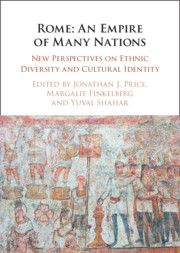Book contents
- Rome: An Empire of Many Nations
- Reviews
- Rome: An Empire of Many Nations
- Copyright page
- Contents
- Figures
- Contributors
- Acknowledgments
- Abbreviations
- Introduction
- Part I Ethnicity and Identity in the Roman Empire
- Part II Culture and Identity in the Roman Empire
- 5 Roman Reception of the Trojan War
- 6 Claiming Roman Origins
- 7 Roman Theologies in the Roman Cities of Italy and the Provinces
- 8 The Involvement of Provincial Cities in the Administration of School Teaching
- 9 Many Nations, One Night?
- Part III Ethnicity and Identity in the Roman Empire
- Part IV Iudaea/Palaestina
- Bibliography
- General Index
- Index Locorum
5 - Roman Reception of the Trojan War
from Part II - Culture and Identity in the Roman Empire
- Rome: An Empire of Many Nations
- Reviews
- Rome: An Empire of Many Nations
- Copyright page
- Contents
- Figures
- Contributors
- Acknowledgments
- Abbreviations
- Introduction
- Part I Ethnicity and Identity in the Roman Empire
- Part II Culture and Identity in the Roman Empire
- 5 Roman Reception of the Trojan War
- 6 Claiming Roman Origins
- 7 Roman Theologies in the Roman Cities of Italy and the Provinces
- 8 The Involvement of Provincial Cities in the Administration of School Teaching
- 9 Many Nations, One Night?
- Part III Ethnicity and Identity in the Roman Empire
- Part IV Iudaea/Palaestina
- Bibliography
- General Index
- Index Locorum
Summary
The myth of Trojan origins of the Romans was given new life in the middle of the first century BCE, with the rise to power of Caesar and Augustus. There was more than one way to negotiate the relationship between Greece and Rome that the myth implied. One way was to continue privileging Romulus and the old foundational legend by marginalizing the myth of Trojan origins along with the antagonism between Greece and Rome that it implied (Horace). Another way was to neutralize the antagonism by claiming that the Trojans were in fact of Greek descent ( Dionysius of Halicarnassus). But it was also possible, rather than avoiding the antagonism, to bring it to the fore by presenting the Trojans and, by implication, the Romans as superior to the Greeks (Vergil). Vergil’s solution suited best the new geopolitical reality and the imperial ambitions of Rome. This transpires not only from the Aeneid but also from those imperial Greek authors who recognized that the traditional narrative of the Trojan War did not suit any longer the world in which they lived. The revised Trojan myth they promulgated brought about a thorough revision of the Trojan tradition, which survived into the early modern period.
- Type
- Chapter
- Information
- Rome: An Empire of Many NationsNew Perspectives on Ethnic Diversity and Cultural Identity, pp. 87 - 99Publisher: Cambridge University PressPrint publication year: 2021



